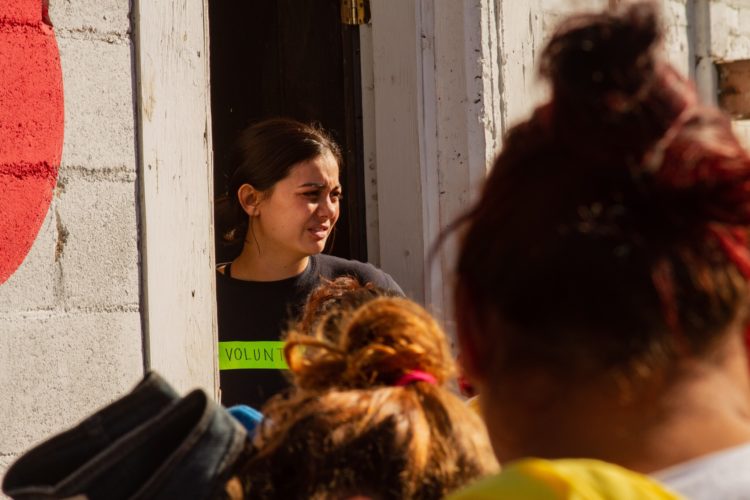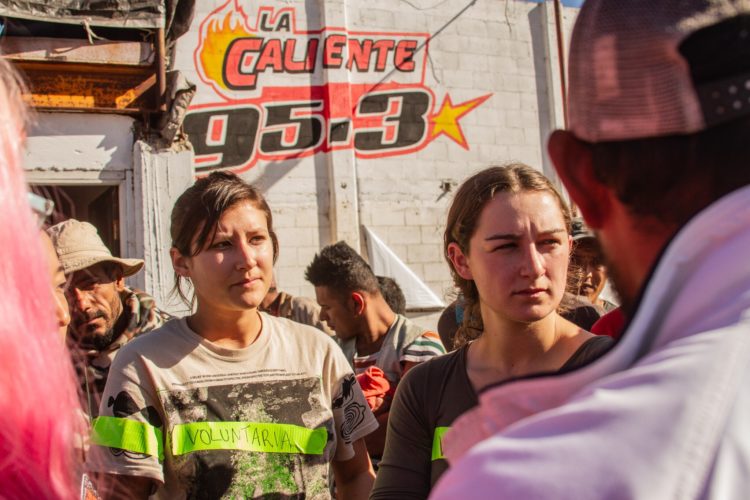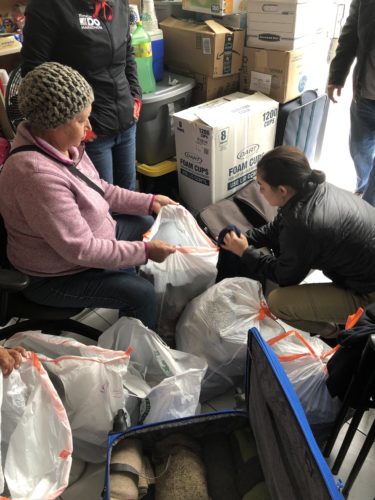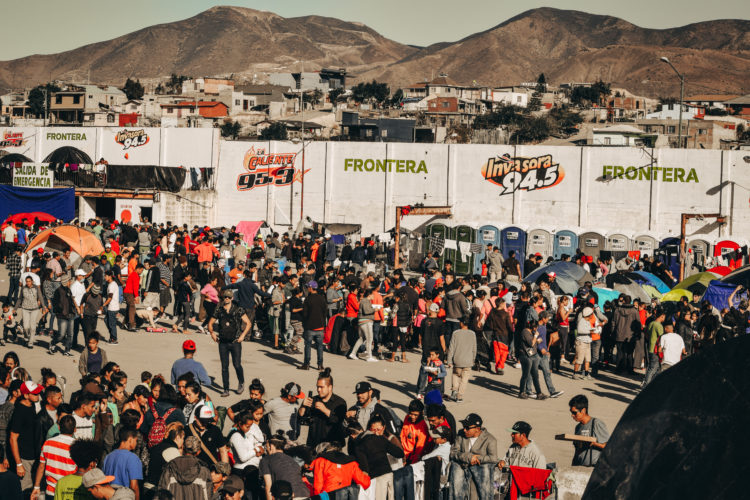With so many immigrants in need, Tijuana has new meaning for Berkeley alumni
Straight out of Berkeley's Human Rights Center, Thanh Mai Bercher and partner Holly Wertman have spent the last few months raising donations and distributing food and clothing to many of those caravaners waiting at camps in Tijuana, Mexico
February 19, 2019

Thanh Mai Bercher works out of a makeshift donation center in the El Barretal camp for immigrants in Tijuana. At its peak, the now-shuttered camp was serving up to 3,000 people per day. (Photo courtesy of Thanh Mai Bercher)
Growing up in Southern California, Tijuana was simply a stopping point for Thanh Mai Bercher. She’d pass through it on her way to visiting family and surfing in Ensenada.
“My family knew Tijuana as a dangerous city that we never stopped in,” Bercher says. “We were always kind of barreling through to get to the beach towns.”
Bercher, a 2017 UC Berkeley graduate and a former fellow with Berkeley’s Human Rights Center, doesn’t make it to the beach so much anymore.
She’s come to regard Tijuana as the place she needs to be. It started last November, when she heard about American border agents tear-gassing immigrants who’d bypassed Mexican police in a surge to try to get to the United States.
She and a group from Movimiento Cosecha, a nonprofit group that advocates for undocumented immigrants, raised donations and then took everything to El Barretal, an open-air entertainment venue that, for a while in December and January, was a temporary shelter for about 3,000 people. It’s since been shuttered.
“There was nothing there. It was a complete humanitarian crisis,” Bercher says. “There was no running water, no filtered drinking water, no toilets, no electricity and no formal security. We saw that and just committed to coming back.”
“We had whole crews of people just to pass out water,” she adds. “One day, we would distribute socks. Another day, it would be underwear. We organized mass purchases, like 1,500 tents. And sleeping bags. There was so much that went into it.”
In the subsequent three months, Bercher and her partner and fellow 2017 Berkeley grad Holly Wertman have spent their time raising money in Northern and Southern California and turning around to purchase supplies the immigrants most needed. The two women are part of a contingent of Berkeley-affiliated volunteers devoting time to that immigrant population, which subsists just east of Tijuana and just south of the U.S.-Mexico border.

Holly Wertman (right) speaks with immigrant caravaners in Tijuana about their needs in the camp. (Photo courtesy of Thanh Mai Bercher)
Bercher trained in public health at Berkeley with a concentration in community health, and Wertman is a trained EMT who studied public health with a concentration in women’s health. Together — and separately — they’ve worked around the world, including in Vietnam, Greece, Palestine and Niger.
They were awarded a project grant to work at a women’s center in Greece this year, but it’s been pushed back by the needs of those in Tijuana.
And the needs keep expanding. The nearest public hospital is 45 minutes away from where most of the immigrant population is currently settled. So, a car shuttle service has been set up — but Bercher and the other Berkeleyans can’t be drivers. American citizens have been pulled over by Mexican authorities and charged with human trafficking, Bercher says, if immigrants are found to be riding with them.
“They (the Mexican authorities) find any kind of thing they can to keep us from doing this work,” she explains.
But Bercher, Wertman and most of the other volunteers don’t seem deterred.

Bercher helps with the distribution of donated supplies to immigrants in Tijuana. (Photo courtesy of Thanh Mai Bercher)
“There’s no question that Thanh is very dedicated and bright,” says Eric Stover, faculty director of the Human Rights Center. “What is so critically important about her is that she comes to this situation from the lens of the public health training she got at Cal. She is looking at the complexity of it all, and not looking at it through social media or from a distance. The fact that she is right there is so extremely valuable.”
“The whole situation at the border is completely unprecedented. But she’s there, she can see a need, go across the border and raise funds for it,” he adds. “When there are people there needing medical attention, she and her colleagues can try and fill the gap.”
When Mexican authorities moved to close El Barretal as a shelter in January, the immigrants and those aiding them did not go away. They just relocated.
And Bercher and Wertman, who have been staying at the homes of friends when in Mexico, have continued to work 11- and 12-hour days, wherever the need is. The fact is, they find inspiration in those who have left Honduras, Guatemala and elsewhere in pursuit of establishing themselves in the United States.
“It infuriates me when people are talking about ‘The Wall’ and talking about migration and saying, ‘It’s just so dangerous, and people shouldn’t do it,'” Bercher says. “It’s not about how dangerous the journey is. It’s about how dangerous it is for them not to make the journey. And to deny that people are going to keep coming here is to deny that there is a humanitarian crisis going on that is going to continue.”
“People are still coming. They are going to keep coming,” she continues. “The caravan is a way to come together as a group and move through very dangerous spaces. This is a movement of people who are self-organized, and they have the right to pursue safety.”

The temporary immigrant camp at El Barretal in Tijuana was packed before being shut down last month. (Photo courtesy of Thanh Mai Bercher)
She says that she’s been surprised by the number of different narratives the immigrants possess. Relatively well-known are people fleeing domestic violence, fleeing gang violence and eluding inept or despotic governments.
“We’ve met lawyers from Honduras who are being persecuted by their government,” she says. “These are people who are trained in international human rights, and they are part of the caravan. It’s not just indigenous people. It’s not just poor people. It’s a lot of different types of people who cannot safely return to their home country.”
Bercher was one of more than 325 undergraduate and graduate students who, during the past 20 years, was chosen to be a Human Rights Center Fellow and funded to work with human rights defenders around the world. Like many of them, she continues to do this work long after her fellowship is finished.
“Students are often transformed by the experience,” says Stover. “Some dedicate their careers — whether as lawyers, health care workers or teachers — to advancing human rights. Thanh is one of the few undergraduates selected to receive this very competitive fellowship, and she continues to show an extraordinary dedication that I have no doubt will persist.”
He adds that Bercher, Wertman and others from the campus help fulfill Berkeley’s ideals by stepping up in Tijuana and all along the southwest border.
Both Bercher and Wertman have day jobs. Bercher is with the Yetunde Price Resource Center in Compton, set up by tennis greats Venus and Serena Williams in honor of their sister, who was killed in a drive-by shooting in 2003. Bercher is trying to map resources so that people in Compton can more easily find information to aid victims of violence, homelessness and other problems in their community. Wertman works for Chrysalis, an agency in Southern California that is mapping homeless populations and the resources they need.
And they continue to be part of the Berkeley community, which Bercher says is actively involved in their work with immigrants and has been donating steadily.
“The Berkeley community has been very generous in getting donations to us and supporting us in any way they can,” Bercher says. “Berkeley continues to be a resource for me.”